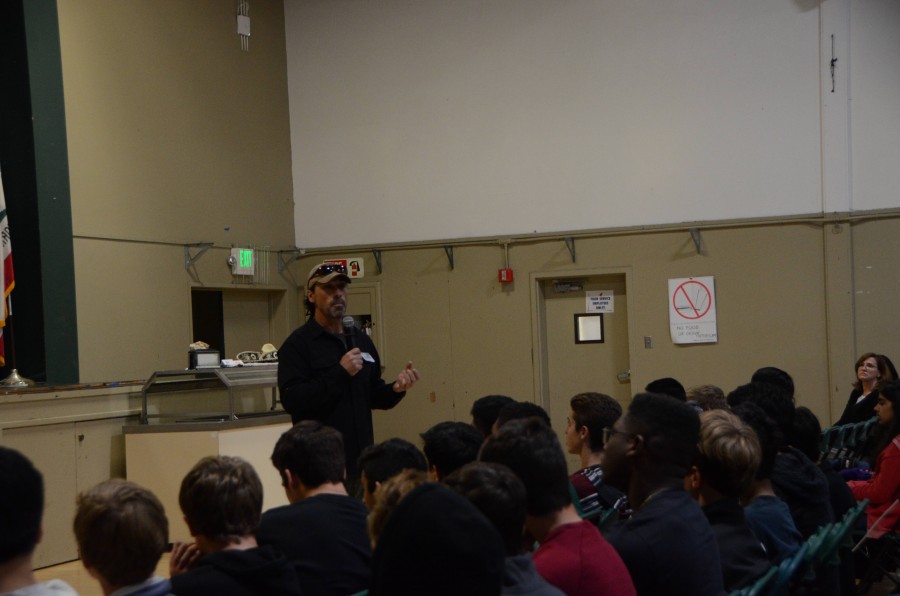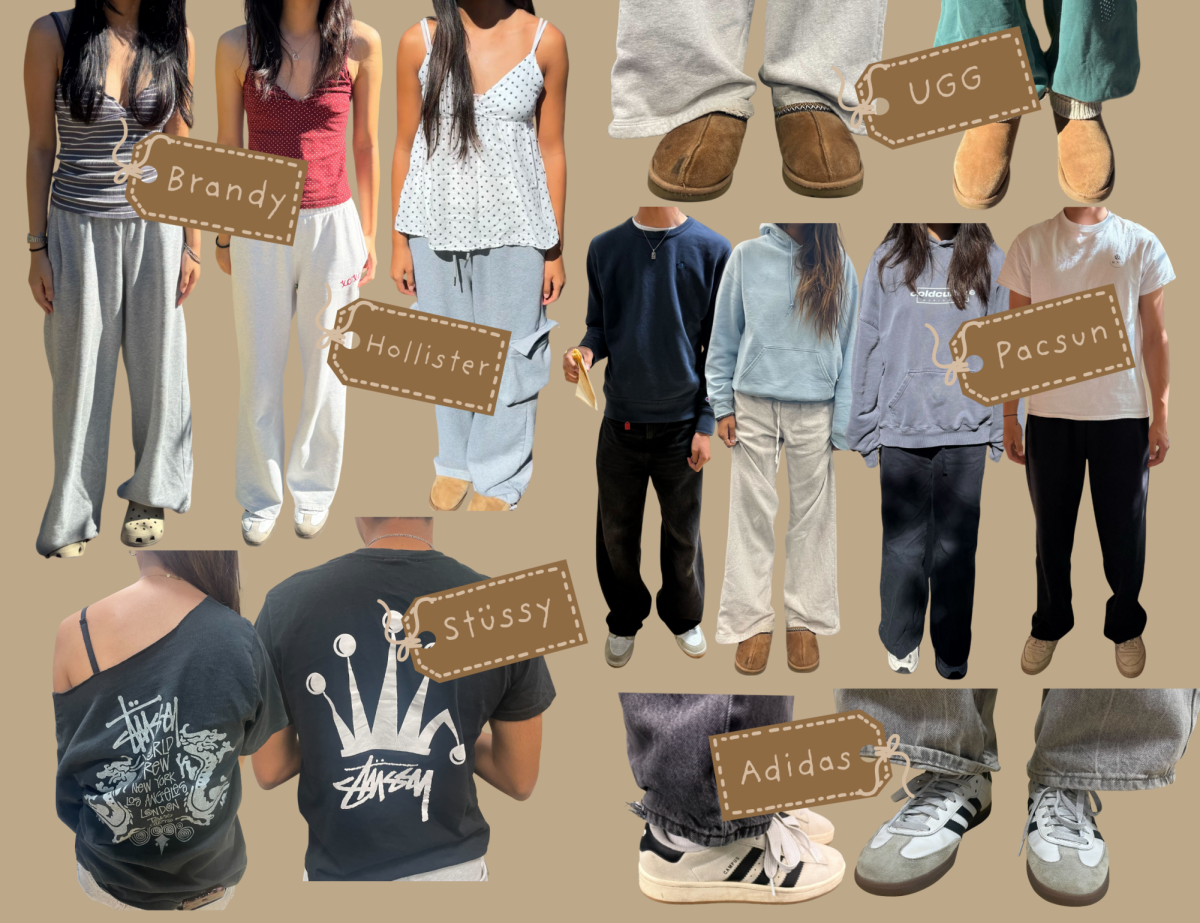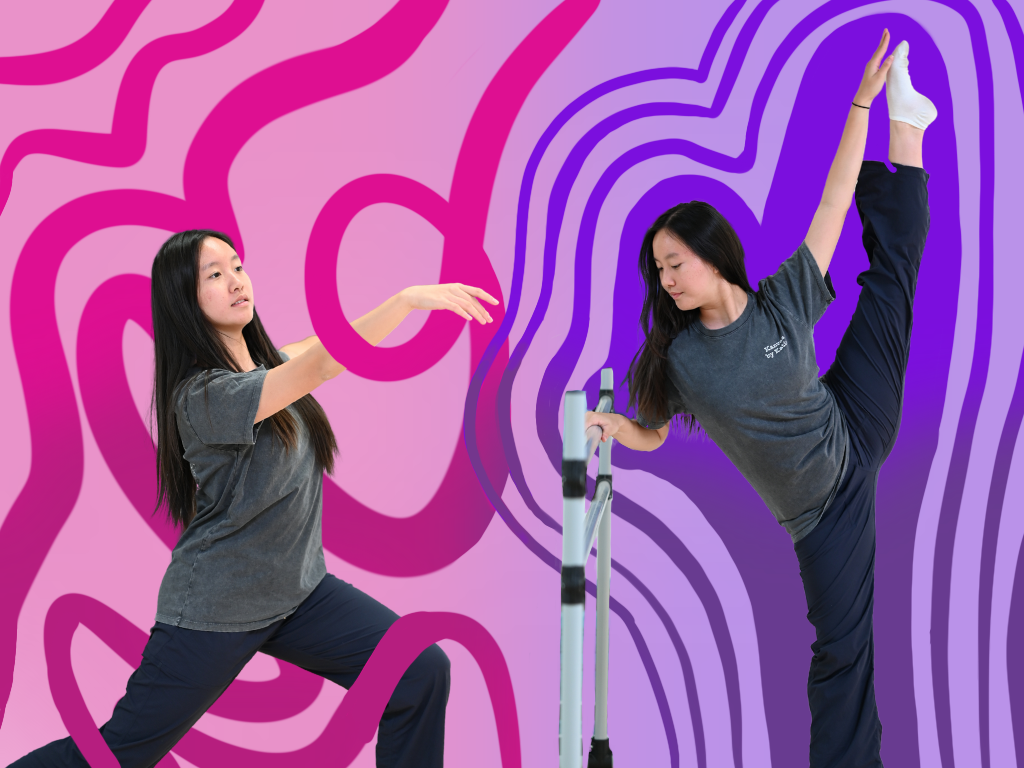Denis Belliveau speaks to freshmen and sophomores at assembly
Dennis Belliveau describes his experiences while traveling in Marco Polo’s footsteps. Belliveau spoke to freshmen and sophomores today about his two-year traveling experience in the footsteps of Marco Polo.
March 23, 2016
Two New Yorkers: one wedding photographer and and one artist. Two years without the comfort of their homes and families. 25,000 miles through the bustling cities and rural villages of Europe and central Asia, across the formidable Taklamakan Desert, and even straight into a firefight in Afghanistan.
Explorer-photographer Denis Belliveau, co-director and writer of the acclaimed documentary In the Footsteps of Marco Polo, spoke at an assembly today to freshmen and sophomores– who viewed the film in their history classes– about the ups and downs of this daunting journey across Asia.
In 1992, Belliveau and close friend Francis O’Donnell embarked on an expedition to Asia, resolved to retrace the historic route of celebrated traveller Marco Polo, a feat that had not been accomplished before. The pair attempted to compare and contrast their own journey with Marco Polo’s and discover whether Polo had been telling the truth in his stories, which have been doubted by many scholars and historians.
During the assembly, Belliveau explained the historical significance of Marco Polo. He began by speaking about the explorer’s childhood, and how the influence of his father and uncle, who were travellers themselves, prompted Marco Polo to embark on his own journeys. Belliveau went on to describe Polo’s twenty-one year term as emissary for Kublai Khan and the production of Polo’s travelogue, entitled The Travels of Marco Polo.
Marco Polo’s reputation influenced Belliveau and O’Donnell to embark on their journey. Many are skeptical of his achievements and believe that it was impossible for him to have gone on such a journey. Belliveau remembered hearing that Venetian children who were lying were told to stop being a “Marco Polo.” Thus, using Polo’s book as a guide, Belliveau and O’Donnell followed in his footsteps and recorded what they saw.
“Having spent two years in his footsteps, there was no question that Marco Polo did his journey. Sure, he exaggerated a couple of times. Maybe there were even a few outright fibs. But overwhelmingly, his book is truthful,” Belliveau said. “Part of the problem is that he wrote his book two hundred years before the printing press, so his book is handwritten. Within his own lifetime, it was copied into every language of Europe. As you can imagine, by the time it gets [translated] it’s completely different. There’s over 150 of these manuscripts that we had to look at and compare, and no two were alike.”
Belliveau told the audience about the lengths that he and O’Donnell went to in order to obtain permissions to cross Afghanistan, Iran and Uzbekistan. They forged visas, bribed guards and obtained permission and protection from an Afghan warlord in order to to safely cross Afghanistan just as Marco Polo had.
However, they were able to experience what Marco Polo had recorded in his account and by doing so, broke barriers between the East and the West. For example, the two obtained holy oil at the Church of the Holy Sepulchre in Israel, crossed the Wakhan Corridor in Afghanistan, becoming the first Westerners from their generation to do so, saw the Reclining Buddha at Zhangye and became the first Westerners to successfully pass through Iran since the 1979 Iranian Revolution.
The trip began in Venice, Italy, Marco Polo’s hometown. Their first destination was Israel, and from there, they went to the Uzbekistani city of Bukhara and then to Afghanistan. They journeyed through the Wakhan Corridor, crossed the Pamir mountains and arrived in the Chinese city of Kashgar. They traveled across the Taklamakan desert to the city of Dunhuang, and then throughout China and Mongolia. The two then took a ship to Sumatra and traveled to Sri Lanka and across India. Finally, they passed through Iran, and in March of 1995, the pair arrived in Venice, where they were hailed as heroes and given access to Marco Polo’s last will and testament.
Belliveau then accepted questions from the audience about his journey. He was asked about his favorite meal, how he took pictures and video, their worst injuries, their treatment in foreign countries, the scariest part of their journey, his regrets about the journey, linguistic features about languages they encountered, and his favorite part of the trip.
“The best parts of the trip were when it felt like Marco Polo was with us, or a place that Marco Polo would recognize today, a place that hadn’t changed, like the Wakhan Corridor of Afghanistan, or the steppes in Mongolia, or parts of India,” Belliveau said. “As you can imagine, Asia is a totally different place now than it was 700 years ago, mostly because of population. Marco Polo would have recounted huge open spaces with no towns or villages. It would be hard to find those pockets now, but we did.”
Several students stayed behind after the assembly to speak with Belliveau and take pictures with him.
“Since everyone watched the movie and knew what he was talking about, it was cool for him to talk about his adventures,” said Arjun Kilaru (9), who stayed afterwards to take a picture with Belliveau. “I think it was really cool because not a lot of people have tried to do something like that.”
After the assembly, Belliveau also spoke to several world history classes, where he elaborated on his story and showed them his travel journal.
“He had a journal and he drew these beautiful pictures,” said Mahi Gurram (9), who listened to Belliveau during history teacher Andrea Milius’s fourth period World History class. “They were lifelike, and it was really good. He drew Buddha, a desert, the caravans he was talking about.”
During this time, sophomore Liana Wang served as his escort, as he went from class to class to speak to students.
“I learned a lot through being able to hear his first-hand experiences about all these different countries and a lot of the predicaments he was in,” Liana said.
Through recounting these experiences, Belliveau hopes to inspire students to become more interested in travelling and having similar adventures of their own.
“I would hope that it creates an excitement for learning about history and other cultures and for traveling, because I truly believe that travelling and learning about other cultures is so important and underrated in the United States,” he said. “The world is a great place and it’s full of good people. There’s more good people than bad, so get out there and see them.”
Belliveau also spoke as a part of the Harker Speaker series at 7 p.m. yesterday in the auditorium.


















![“[Building nerf blasters] became this outlet of creativity for me that hasn't been matched by anything else. The process [of] making a build complete to your desire is such a painstakingly difficult process, but I've had to learn from [the skills needed from] soldering to proper painting. There's so many different options for everything, if you think about it, it exists. The best part is [that] if it doesn't exist, you can build it yourself," Ishaan Parate said.](https://harkeraquila.com/wp-content/uploads/2022/08/DSC_8149-900x604.jpg)




![“When I came into high school, I was ready to be a follower. But DECA was a game changer for me. It helped me overcome my fear of public speaking, and it's played such a major role in who I've become today. To be able to successfully lead a chapter of 150 students, an officer team and be one of the upperclassmen I once really admired is something I'm [really] proud of,” Anvitha Tummala ('21) said.](https://harkeraquila.com/wp-content/uploads/2021/07/Screen-Shot-2021-07-25-at-9.50.05-AM-900x594.png)







![“I think getting up in the morning and having a sense of purpose [is exciting]. I think without a certain amount of drive, life is kind of obsolete and mundane, and I think having that every single day is what makes each day unique and kind of makes life exciting,” Neymika Jain (12) said.](https://harkeraquila.com/wp-content/uploads/2017/06/Screen-Shot-2017-06-03-at-4.54.16-PM.png)








![“My slogan is ‘slow feet, don’t eat, and I’m hungry.’ You need to run fast to get where you are–you aren't going to get those championships if you aren't fast,” Angel Cervantes (12) said. “I want to do well in school on my tests and in track and win championships for my team. I live by that, [and] I can do that anywhere: in the classroom or on the field.”](https://harkeraquila.com/wp-content/uploads/2018/06/DSC5146-900x601.jpg)
![“[Volleyball has] taught me how to fall correctly, and another thing it taught is that you don’t have to be the best at something to be good at it. If you just hit the ball in a smart way, then it still scores points and you’re good at it. You could be a background player and still make a much bigger impact on the team than you would think,” Anya Gert (’20) said.](https://harkeraquila.com/wp-content/uploads/2020/06/AnnaGert_JinTuan_HoHPhotoEdited-600x900.jpeg)

![“I'm not nearly there yet, but [my confidence has] definitely been getting better since I was pretty shy and timid coming into Harker my freshman year. I know that there's a lot of people that are really confident in what they do, and I really admire them. Everyone's so driven and that has really pushed me to kind of try to find my own place in high school and be more confident,” Alyssa Huang (’20) said.](https://harkeraquila.com/wp-content/uploads/2020/06/AlyssaHuang_EmilyChen_HoHPhoto-900x749.jpeg)










